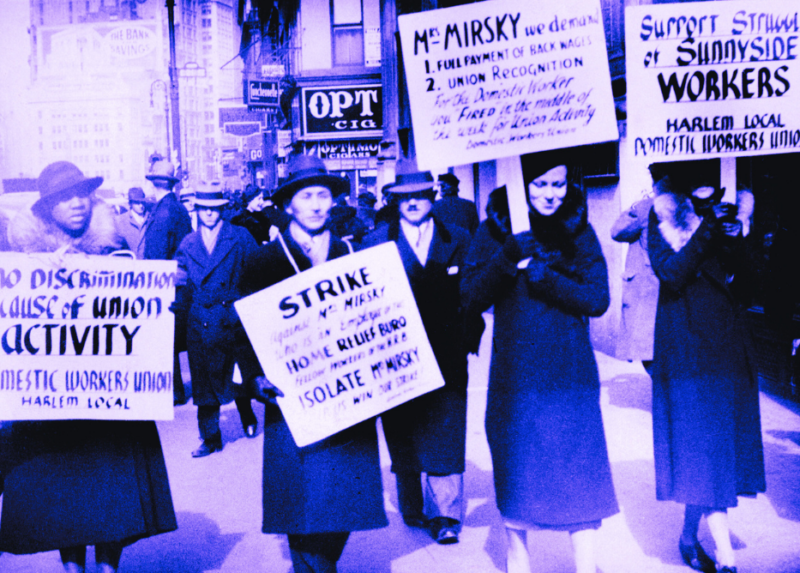
A brief literary history of May Day.
Happy International Worker's Day!
Happy May Day, comrades! Today we celebrate international worker’s rights, and the rites of spring according to ye olde Pagan calendar. I hope all of you are clocking out right at five today and spending some time in the sun.
Though American workers have been agitating for improved conditions since at least the 1860s, we often trace the beginning of the organized American labor movement to Chicago in 1886. On May 1st of that year, tens of thousands of workers walked off the job and into the streets to call for an eight hour work day. On the fourth day of strikes, violence erupted.
Attempting to suppress protestors, police conducted mass arrests. Organizers were martyred, and many sustained injuries in the ensuing Haymarket affair.
As Jeff Schuhrke writes in a great history for Jacobin, the event was made official four years after, when “workers in multiple countries staged strikes and demonstrations demanding the [still un-codified…] eight-hour day.” Those protestors invoked the Haymarket martyrs and called their day of action International Workers Day. And lo, May Day was born.
The worker’s rights scene has always included writers. Like the famous anarchist Emma Goldman, who wrote essays, tracts, and memoirs about the cause. But certain authors are heavily associated with those first May Days.
Upton Sinclair’s The Jungle was conceived as a case for worker’s rights. This dark exposé of the American meat-processing industry—which you might recognize from the eighth grade summer reading list—was initially published as serial installments in the socialist newspaper, Appeal to Reason.
Published as a novel in 1906, the book spawned a massive public outcry. Though it didn’t immediately move the needle on working conditions as Sinclair hoped it might, his reports from the factory floor did lead to the passage of several food safety laws. (And to this day, we can assume the novel mints many a 14-year-old vegetarian.)
Sinclair’s blockbusting book arguably inaugurated a muckraking tradition. Into the 1930s, other writers followed the investigative example set by Sinclair and other vanguard journalists, like Ida B. Wells. Exposing unjust workplaces became common narrative practice in journals like McClure’s. Ida Tarbell took on Standard Oil. Lincoln Steffens looked at municipal corruption. And still on the labor bent, Sinclair took on the coal industry.
In 1908, the nascent labor movement received another kind of appeal to reason. Jack London’s The Iron Heel, a dystopian novel, imagines a worker-led revolution. A committed socialist all his life, London’s nakedly anti-capitalist book is framed as a history from a parallel universe. Trotsky himself approved of the novel’s accounting of “trade union bureaucracy.”
The Iron Heel also inspired a whole generation of capitalism-critical writers. Like George Orwell.
But as is the way with all hot topics, eventually a rich kid waded in. In 1920, F. Scott Fitzgerald wrote a story called “May Day” following a set of Ivy League grads fretting against a backdrop of labor protests.
Collected in Tales of the Jazz Age, Fitzgerald’s angle on the labor movement is quite a bit more even-handed than Sinclair’s or London’s or eventually Orwell’s ideological offerings. But though it’s not at all a piece of agitprop, Fitzgerald’s story does examine the spiritual tax of unexamined privilege. Which grand tradition we can trace well into today’s literary fiction.
Maybe your May Day wants that kind of novel. But if you’re curious about the history of the labor movement, there’s a deep bench of non-fiction, from manifestos to memoirs. Verso Books has a great back catalogue on worker’s rights, and happens to be having a sale today.
And if you’d rather not read the day away, “Fragile Juggernaut,” a new podcast from Haymarket Originals, picks up an American labor history with the formation of the CIO in the 1930s.
Today I celebrate the literary International Worker with an eye to history. After wrapping work at a humane hour thanks to those union leaders of yore, I’m heading to the library to pick up The Incomplete, True, Authentic, and Wonderful History of May Day by Peter Linebaugh. I’ll be sure to let you know how it is.
In the meantime, solidarity and sunshine to you and yours. You can find a May Day action here.
Image via
Brittany Allen
Brittany K. Allen is a writer and actor living in Brooklyn.



















